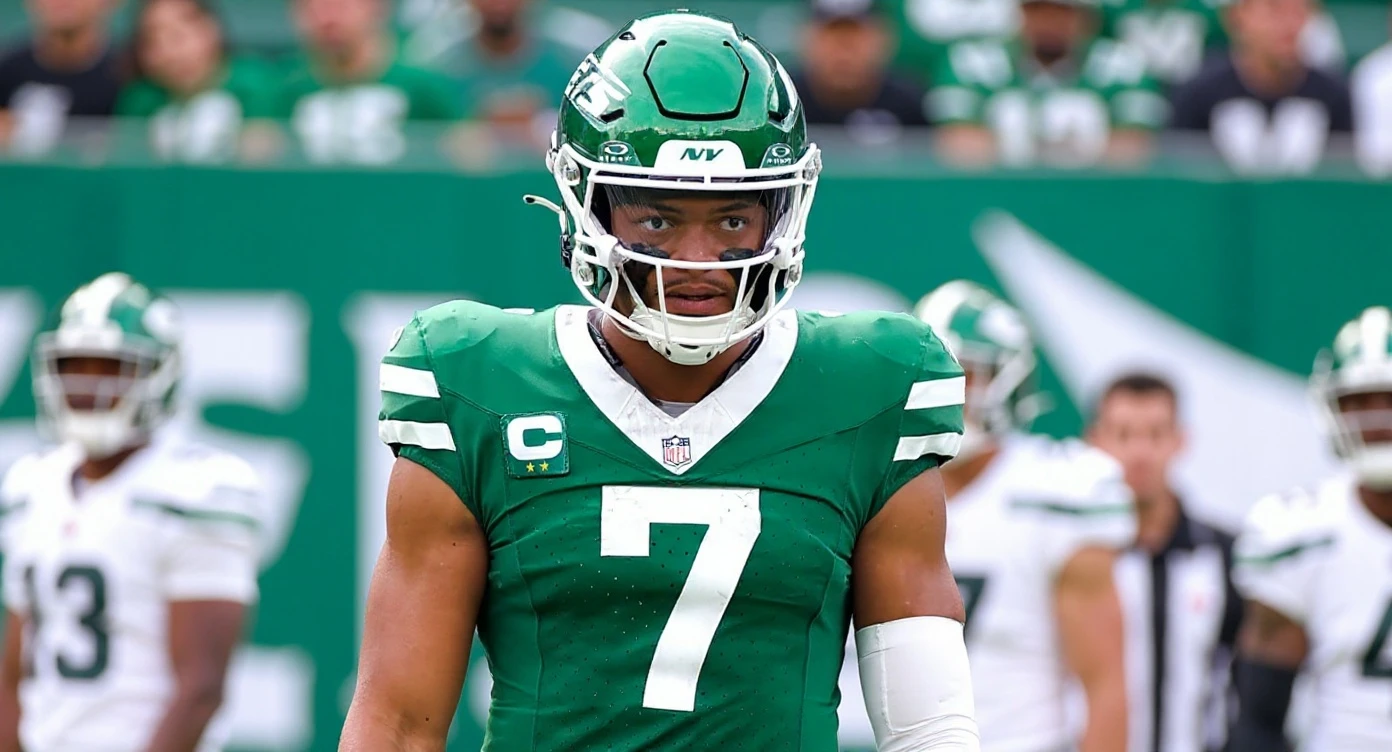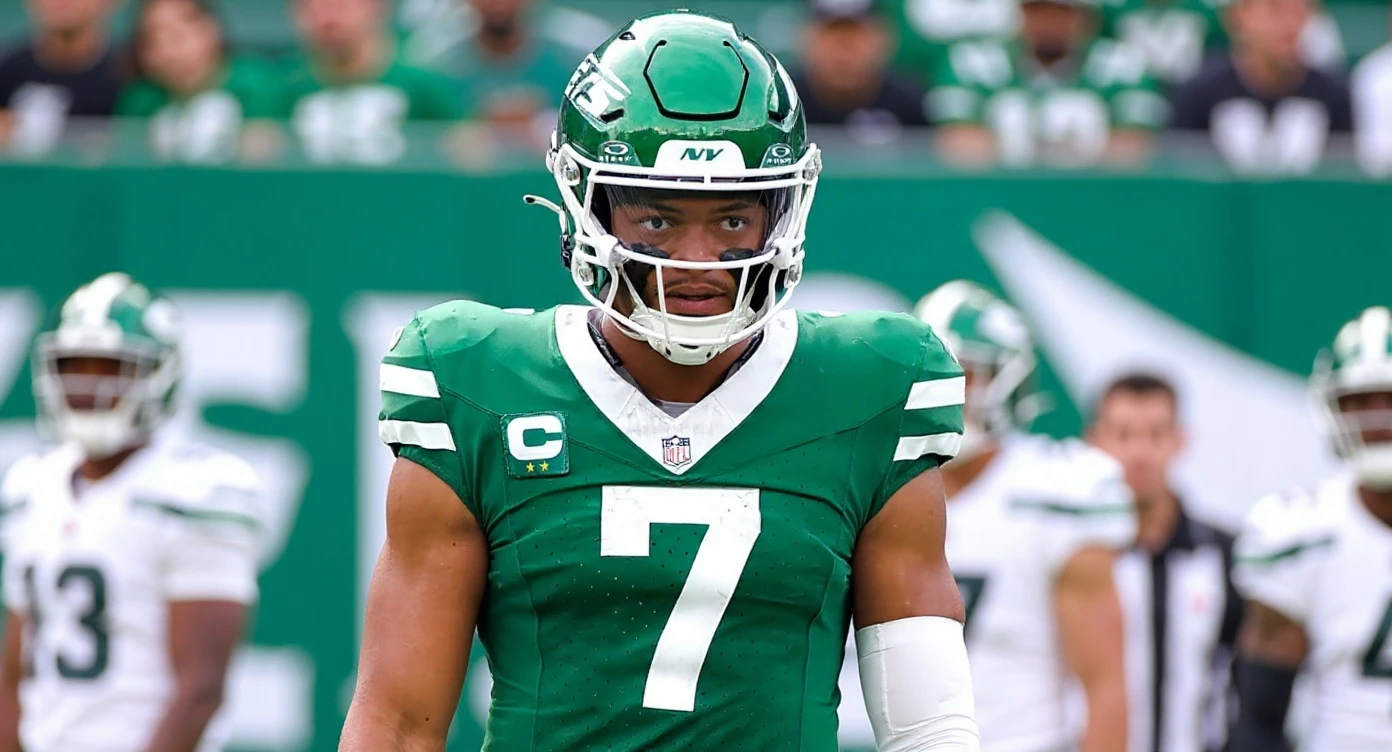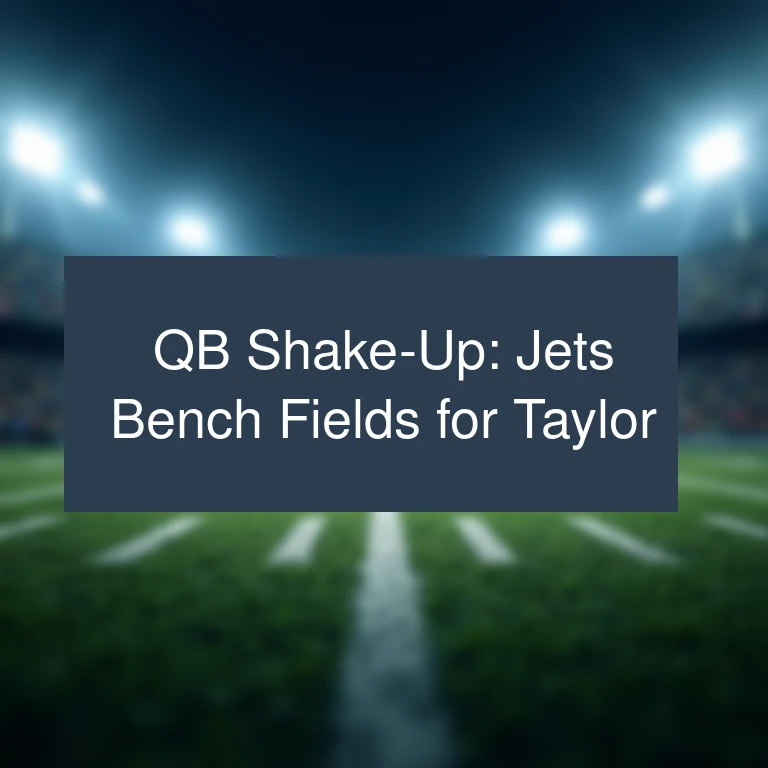In a surprising move, the New York Jets have decided to bench their young quarterback Justin Fields in favor of veteran Tyrod Taylor. This decision has sparked a heated debate among fans and analysts about the team’s direction and future.
Want to know what people are really saying? Don’t miss the buzz from Reddit at the end!
The Rise and Fall of Justin Fields
Justin Fields has been benched by the New York Jets, marking the second consecutive season he’s lost his starting position. After leading the Pittsburgh Steelers to a 4-2 record last season, Fields found himself displaced by Russell Wilson’s return. Now with the Jets—a team that signed him to a two-year, $40 million contract in March 2025—he’s been replaced by veteran Tyrod Taylor as the organization sits at 2-8. First-year head coach Aaron Glenn made the switch, signaling yet another pivot away from Fields despite solid individual performance.
To make matters worse, Jets owner Woody Johnson publicly criticized Fields following the team’s winless start through seven games, calling it “hard” to win “when you have a quarterback with a rating that he’s got.” This recurring narrative—talented young quarterbacks being benched for veteran alternatives—raises profound questions about organizational philosophy, coaching uncertainty, and what truly determines success. Fields’ benching reflects a broader NFL trend: Bryce Young, Anthony Richardson, and others face similar mid-season decisions. The pattern suggests something deeper than simple performance metrics.

The Stats Don’t Tell the Whole Story
Fields’ statistical profile with the Jets reveals a paradox that complicates the benching narrative. He completed 62.7% of his passes this season with seven touchdowns and just one interception—numbers suggesting competent quarterbacking. He accumulated 1,305 passing yards across 213 attempts and showcased modern quarterback versatility with 402 rushing yards on 74 carries, including 5 rushing touchdowns. Yet the Jets managed only 2 victories in his 7 starts. This disconnect illuminates a fundamental truth: quarterback performance exists within a complex ecosystem. Offensive line effectiveness, play-calling schemes, receiver availability, and defensive capability all intersect to determine outcomes.
The Jets made unwanted NFL history by becoming the first team since 1933 to complete their first five games without recording a single takeaway. This defensive ineptitude, coupled with coaching struggles, suggests systemic organizational dysfunction. Fields’ solid completion percentage, favorable touchdown-to-interception ratio, and rushing production indicate he wasn’t the primary problem. The gap between his personal statistics and team results points toward deeper issues: insufficient offensive line protection, suboptimal route concepts, inadequate receiver separation, and defensive inadequacy that placed overwhelming burden on the offense.
Why Teams Keep Making the Same Bet on Veteran Alternatives
Both the Steelers and Jets opted for the familiar comfort of experienced quarterbacks rather than committing to Fields’ development. Pittsburgh selected Russell Wilson, a proven veteran with a championship resume. New York turned to Tyrod Taylor, a 15-year professional with 59 career starts—a resume representing organizational stability through longevity and credibility. Taylor’s Pro Bowl selection and high-pressure experience position him as insurance against continued losing. Aaron Glenn, navigating his first year as head coach of a franchise with nine consecutive losing seasons, faces intense pressure to demonstrate immediate improvement.
The benching reflects not only quarterback evaluation but Glenn’s broader mandate to turn around systemic dysfunction. Taylor remained with the Jets despite requiring arthroscopic knee surgery during preseason, indicating organizational commitment to his availability. This approach to veteran reclamation isn’t inherently wrong, yet it frequently mirrors organizational panic rather than strategic vision. Veterans can provide temporary stability, but they rarely address underlying structural problems. The repeated substitution of proven veterans for promising young talent suggests front offices prioritize short-term confidence over long-term quarterback development.
The Chemistry Factor: Why Fields Isn’t Giving Up
Despite consecutive benchings, Fields has maintained a remarkably composed demeanor rooted in pragmatic optimism. Rather than becoming defensive or bitter, he’s expressed genuine excitement about his Jets opportunity, suggesting uncommon maturity in processing professional setbacks. A significant element involves his established chemistry with former Ohio State standouts now on the Jets roster—Garrett Wilson and Jeremy Ruckert. These foundational relationships carry considerable weight in professional football, where established communication patterns, mutual understanding of tendencies, and pre-existing trust substantially accelerate offensive cohesion.
Circumstances may yet provide Fields another opportunity: Taylor dealt with ongoing knee concerns and, prior to Week 8 against Cincinnati, Aaron Glenn ruled Taylor out and named Fields the starter, suggesting Fields’ tenure may prove more dynamic than the initial benching suggested. His composed response to adversity and identifiable connections within the organization demonstrate resilience. Whether this Ohio State triumvirate can translate college-era familiarity into NFL success during future opportunities remains uncertain. However, Fields’ demeanor suggests he hasn’t surrendered on his trajectory despite consecutive institutional decisions, positioning him as a thoughtful competitor awaiting his next meaningful opportunity.
A League-Wide Pattern of Veteran Churn and Professional Pragmatism
The narrative surrounding Fields’ benching extends beyond the Jets organization to reflect a broader NFL pattern where veteran quarterbacks cycle through rosters with remarkable consistency. The revolving door of veteran reclamation suggests a fundamental imbalance in how teams approach quarterback management—one that prioritizes immediate stabilization over developmental commitment. This pattern raises important questions about organizational learning and whether teams genuinely believe in long-term quarterback building or simply react to pressure with predictable veteran solutions.
Tayrod Taylor exemplifies this phenomenon. His 14-year career reveals a career trajectory that contradicts traditional quarterback development arcs: he has rarely begun seasons as the designated starter, yet finds himself named the opening day starter or emergency replacement with stunning frequency. His career earnings exceeding $77 million—achieved primarily through backup compensation and spot starts—demonstrate that the modern NFL occasionally rewards the role of reliable veteran caretaker. For Fields, observing Taylor’s career offers a peculiar form of cautionary instruction: financial security and sustained NFL employment remain achievable through longevity and reputation, even without continuous starting opportunities.
From an organizational perspective, the impulse to turn toward familiar veteran presence during crisis moments makes intuitive sense. First-year coaches navigating historically dysfunctional franchises face intense pressure to demonstrate immediate competence. Reaching for established veterans projects stability, suggests decisive leadership, and provides plausible deniability if outcomes fail to improve—the logic being that any failure results from systemic problems rather than quarterback evaluation mistakes. Yet this pattern perpetuates itself precisely because it forestalls meaningful organizational accountability.







Internet Reactions to the Jets’ Quarterback Shakeup
The Jets’ decision to bench their promising young quarterback Justin Fields in favor of veteran Tyrod Taylor has sparked a range of reactions from the online sports community. While some commenters empathize with Fields’ situation and advise him to seek opportunities elsewhere, others express little confidence in the team’s latest move, questioning whether Taylor can truly revive the struggling Jets’ offense.
Some commenters acknowledge the potential value that Tyrod Taylor’s experience could bring to the Jets’ offense, drawing comparisons to the veteran quarterback’s lengthy career and substantial earnings. However, they caution that Fields should view Taylor’s path as a cautionary tale, highlighting the risk of being trapped in a cycle of short-term starting opportunities without ever fully realizing one’s potential.
Amid the varied reactions, some commenters express a sense of resignation, suggesting that the Jets’ decision to turn to Tyrod Taylor is unlikely to make a significant difference in the team’s performance or trajectory. They imply that the coaching staff’s judgment is already in question, and the quarterback change may be more of a symbolic gesture than a truly impactful move.